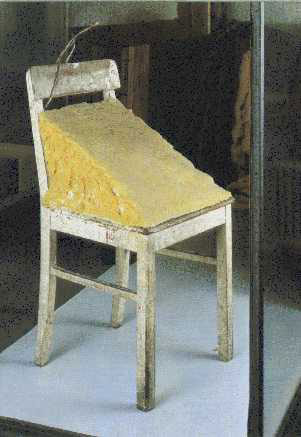
1) Art that is directly playing with politics is still difficult to cope with. It seems vulgar, it seems to enter in a dialogue with people who don't deserve it (I don't only mean this or that politician: Clean Hands is a reference to an anti-mafia group of the same name).
That's my first, largely intuitive, impression. Then I realize this attitude of mine might still be a modernist left-over, and on a conscious level I would probably associate it with a defensive artistic attitude of hiding away into the abstract, the "purely artistic", i.e., whatever is not directly related to current events and problems. In that sense, maybe I would instinctively opt for art that doesn't deal with time that is as raw as the time of everyday news.
Surprizingly, I would say we allow some forms of art to enter the political (and generally social, current, raw-timed) sphere more than others - films related to politics or social issues are okay, plays require some level of abstraction, while sculptures tend to stay far from the "raw world", paintings - as well; but photographs, on the other hand, integrate the current/ political with not problem, same as literature. The "finer" the art, the more resistance to reality? It almost seems as if the political game Monti plays were an intrusion (?).
Compare Clean Hands with Beuys' Fat Chair.

Without attempting to compare the quality of the two works, I can still say Beuys' work is a relief. It moves away from the immediate into a zone of phantasy and subtle allusion.
(Curiously enough, the dadaists, who were very openly political in their endeavors, ended up by being associated with random poetry and the search for the unreal (surreal, we would anachronically say today)).
2) Being Polish, I could never make a bar of soap from human fat. Maybe I'm old-fashioned, but I don't think so. A huge part of our school lectures have to do with war. We learn about the Nazi experiments with creating soap from human fat both in history lessons and Polish literature, on several occasions. Most of us (including myself) have visited Auschwitz, etc., etc. A Polish person could maybe (maybe) have created something similar to Beuys' work (1964), "sublimating" the trauma of war (for a modern "sublimation" of the war experience, check out the Georgian/German newimages blog). The case of Gianni Monti's work is quite different: it is creating the object itself. It is changing its significance to a playful-ironic-political one.
What's ironic is that the two works I mentioned were created by a German and an Italian, both apparently able to overcome the weight of direct war associations of war. The Poles were the war's victims - and after all these years, the 27-year-old author of these words still discovers it influencing how he thinks and creates.
ps: if anyone is still interested in the tired discussion about "is it art", or feels like being appalled, I've addressed that in my comments at this site.
Technorati:

0 comments:
Post a Comment